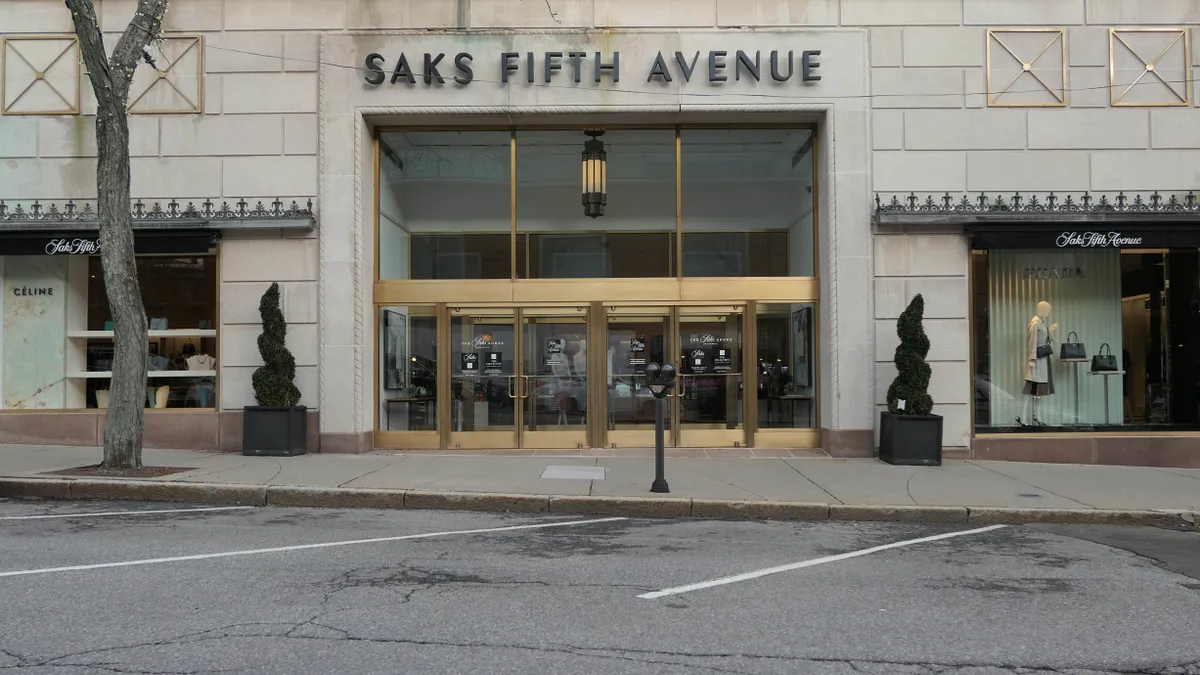Dive Brief:
- After taking a 4.3% stake in retail holding company Hudson’s Bay, the hedge fund Land & Buildings Investment Management pressed the retailer’s board of directors in a letter Monday to “aggressively” monetize its real estate portfolio. Land & Buildings founder and Chief Information Officer Jonathan Litt, who signed the letter, proposed Hudson’s Bay sell its “crown jewels” — among them its Saks Fifth Avenue store property on Manhattan's Fifth Avenue.
- Litt also suggested that selling off Hudson’s Bay’s real estate — which for the retailer could mean losing control and occupancy of some of its most prized and profitable stores — could help fund a transaction to take the company private.
- In a press release Monday, Hudson’s Bay acknowledged it had received and was reviewing the letter and “will respond in due course.”
Dive Insight:
If you’re a retailer who owns a sizable share of your store footprint, you can more or less expect to become a target of Wall Street activists at some point.
Where retailers see stable balance sheets and operational control in property ownership, hedge funds often see valuable assets that can be sold for cash and passed along to investors. In his letter, Litt said that, unlike other retailers, Hudson’s Bay owns the “vast majority” of the real estate its stores occupy. “Hudson‘s Bay is a real estate company, full stop,” he said. “If there is a smarter and better use of any or all of the locations, stores should be closed and redeveloped and put towards their optimal use.”
Hudson’s Bay has already taken dramatic steps to squeeze cash value out of its real estate holdings. In the past two years it has forked over properties to joint ventures with Simon Property Group and Canadian REIT RioCan. The company's executive chairman Richard Baker said recently that Hudson's Bay moved too slowly in putting the joint venture up for an IPO, according to a transcript from Seeking Alpha. Investors gave the company’s stock a bump after hearing Baker’s comments, under the assumption the company was ready to sell off its stake in the real estate ventures.
By creating joint ventures for its properties, Hudson’s Bay has already moved further and faster in monetizing its real estate than fellow department store operator Macy’s. Activist hedge fund Starboard Value in May dropped its stake in Macy’s after losing patience with management’s more cautious and meticulous approach to its portfolio.
Sears has also spun off properties into a separate company controlled by Sears CEO Eddie Lampert. Mark Cohen, a former retail executive and current director of retail studies at Columbia University’s Graduate School of Business, described Sears’ property sales in an earlier interview as “asset stripping at its worst.”
Macy’s executives previously considered the joint venture spin off of properties but rejected it, opting instead to maintain control of the portfolio and hold on to their high-grade bond rating. Instead of selling off properties en masse, they are selling those that are unprofitable, or selling unneeded parts of high-value real estate (such as in San Francisco), or looking at redevelopment opportunities and places where they can add additional buildings that can be monetized.
Like Starboard’s approach to Macy’s, Land & Buildings wants Hudson’s Bay to sell off even the real estate connected to its most important store. For Hudson’s Bay, that is the Saks store across from Rockefeller Center in Manhattan, an iconic store not only within Saks’ history but also New York's. According to the hedge fund, that store alone is worth a net of $16 per share(Canadian) and “is likely one of the most valuable locations not only in Manhattan, but in the United States.”
More provocatively, Litt posed the question: “Is the best use of this location truly a department store?” (Hudson's Bay did not respond to a request for comment.)
Given that the hedge fund is targeting Hudson’s Bay, it’s somewhat ironic that it is suggesting the company could use proceeds from property sales to take it private — a move that among other potential benefits would shelter it from activist investors. But to some observers, it makes perfect sense. “I am not surprised at all by the hedge fund's desire to see Hudson Bay taken private to then capitalize on its real estate value,” Nick Egelanian, president of retail development consultants SiteWorks International, said in an email to Retail Dive on Tuesday.
“Astute investors realize that the entire department store industry, save for a few higher end stores like Nordstrom and Neiman Marcus, is in its last phase of relevancy," Egelanian added. "Total industry volume is down to a mere $70 billion in the U.S. and declines continue with accelerating store closures. … Hudson Bay is real estate rich, especially with its acquisitions in recent years. The most logical thing to do in this situation is to try to extract the most value possible from the department store real estate it owns.”












